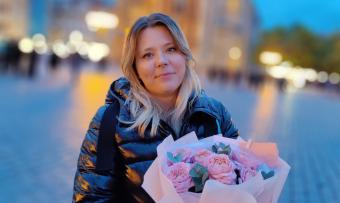Once upon a time, there was the perfect synchronicity of Fred Astaire and Ginger Rogers, the commanding partnership of Rudoph Nureyev and Margot Fonteyn, the electrifying chemistry of Olivia Newton John and John Travolta.
Now meet Robert Mikulik and Veronika Svobodová. She is passionate about ballet and a prize-winning choreographer; he lights up the dance floor at parties. But for their stage they have chosen the world of stroke care transformation where their pas de deux of well over a decade has resulted in profound change and radical innovation.
It’s not unlike choreography, Veronika explains of her work as a stroke research manager, a role she carved out herself. “When creating a show, you have to find the right people, funding for costumes, and opportunities for performance. The others are on stage because they’re better dancers than me, but I am better at something else.”
Away from the floodlights, she is a grant specialist with a gift for turning ideas into projects: “I look for what is needed in stroke care, come up with ideas, search for solutions, design that into projects, bring together the right people and funding, and then manage these projects that turn those ideas into reality.”
Her skill at navigating the intricate processes associated with securing and managing grant funding has funneled 12 million euro into stroke research in the last five years alone.
With neurology professor, stroke research director and RES-Q founder Robert Mikulik, Veronika shares a dyadic relationship based on the notion that two heads are better than one, especially when the two have complementary skill sets and perspectives. The sum of his clinical expertise and her operational and organizational efficiency is greater than its parts and ensures that innovation is grounded in both medical excellence and sound implementation.
Robert often says that she brings ideas no one else does. It’s one of the advantages of a different perspective.
Bring on the revolution
Veronika recognizes that theirs is a consequential partnership. Waving aside a question about intersecting personal and professional lives, she asserts that “for the world it is best that we met and that we put our brains together”. It’s a perfectly accurate conclusion when you consider the ideas that have already sprung from this dyad, or thrived under its leadership:
- Veronika learnt about simulation methodology through her association with the Mayo Clinic and it became her passion. With Robert she developed a simulation training program to reduce door-to-needle times that was embraced and amplified by the Angels Initiative in countries around the world. Numerous studies have demonstrated that simulation-based interventions reduce treatment times, increase recanalization rates and improve outcomes for patients with ischaemic stroke.
- At ESOC this past May, Veronika stepped down after a decade of managing ESO-EAST. The idea to form a group and design a program to improve stroke care quality in Eastern Europe, had over the course of 10 years grown into a project involving 25 countries.
- The need for a quality improvement tool to carry out the ESO-EAST mandate, led to the creation of RES-Q, which is now the preferred stroke registry in close to 100 countries and the evaluation partner for the Angels Awards. Co-founder and joint strategist Veronika obtained funding, helped develop and implement stroke care quality monitoring methodology, and gave the project its name.
- Originally located within the International Clinical Research Center of St Anne’s University Hospital in Brno (where Veronika is the stroke research program manager), RES-Q now operates under the Health Management Institute (HMI), a non-profit organization of which Veronika is cofounder and CEO. While its focus is on developing and implementing innovative technologies in healthcare, in particular new AI-based tools, Veronika also envisages their participation in awareness campaigns and patient support programs.
- Finally, there is RES-Q+, a project that secured 8 million euro through the Horizon Europe grant program for the deployment of artificial intelligence in the fight against stroke in Europe. Coordinated by the Institute of Health Information and Statistics of the Czech Republic, this four-year project, which involves a consortium of 21 partners in 13 countries, is lead by Robert and managed by Veronika. It is widely considered the beginning of a revolution in healthcare – and not only for stroke.
Inside the machine
A childhood steeped in discipline and creativity afforded the ideal conditions for developing the unique set of skills and attributes that drives Veronika’s success. It was an environment that gave her “permission to do something more than expected”, she says. There were high expectations to deliver the best results possible – from both her parents and herself – as well as the freedom to explore her creativity and express her passion for the arts.
She practiced ballet – that most disciplined of art forms – for over 30 years, but these days dances only with her young niece, the way she used to dance with her 12-years-younger sister. (This younger Svobodová sibling happens to be the founder of Hobbit, a groundbreaking schools-based stroke awareness project that grew out of a high-school thesis she composed at 16.)
It is consistent with these formative influences that Veronika holds a degree in business and management from Mendel University and another in music management from the Janáček Academy of Performing Arts, both in Brno.
Her career took shape when she volunteered to help friends structure a grant application. Then word got round, and she started helping other research teams too. By 2009 she was among a group of enthusiasts that secured funding for the International Clinical Research Center at St. Anne’s University Hospital. Over the next five years she built and led a grant office that secured an additional 20 million for the center. Then, having shifted her focus to stroke, she convinced the hospital to appoint the first and so far only stroke research manager in the Czech Republic.
Grant applications are highly competitive, but Veronika is too. Because there’s always something that can be improved, she uses every hour afforded by a deadline, even though it can mean working nonstop for as many as 56 hours. A win gives her the satisfaction of knowing the work will be moving forward and that they’ve taken another step towards getting knowledge to physicians or the best product to patients.
Veronika says she is temperamentally suited to working “inside the machine and letting others shine”. Pressure? She likes it. In fact, once a grant has been secured, she experiences an emptiness that she compares to the feeling at the end of a performance after the applause has died down.
It’s about dreams
Colleagues, collaborators and occasional sparring partners, Robert and Veronika are also fellow dreamers for whom downtime is an opportunity for dreaming of what may be possible in ten years’ time. Yes, even on a recent short break in Spain. There’s no hand-wringing here about work-life balance; creating HMI as a vessel for their dreams has finally blurred the line between life and work. While Robert is immersed in research and expanding his knowledge, Veronika embraces the complex task of “turning dreams into goals and goals into KPI’s and then ensuring they’re met”.
“It’s our passion and we like it,” she says. “I really hope it continues forever, that are we are building a basement for something bigger and enduring.”
There’s now an opportunity to rekindle another passion. In a new project that’s just getting off the ground, Veronika will combine her love for the arts and her knowledge of stroke care to establish a choir for people with aphasia – not only after stroke, but also from other causes. Research, albeit limited, suggests that singing can support speech recovery in people with aphasia. The aim, she says, is to help participants express themselves and reconnect with others through singing.
She has already secured some basic funding, and if they’re ready to launch before the end of the year, this life-affirming choir may make its debut with a Christmas carol – imparting a moment of beauty and emotion to an already substantial legacy that rests on the simplest of motives: “I like improving the world.”

